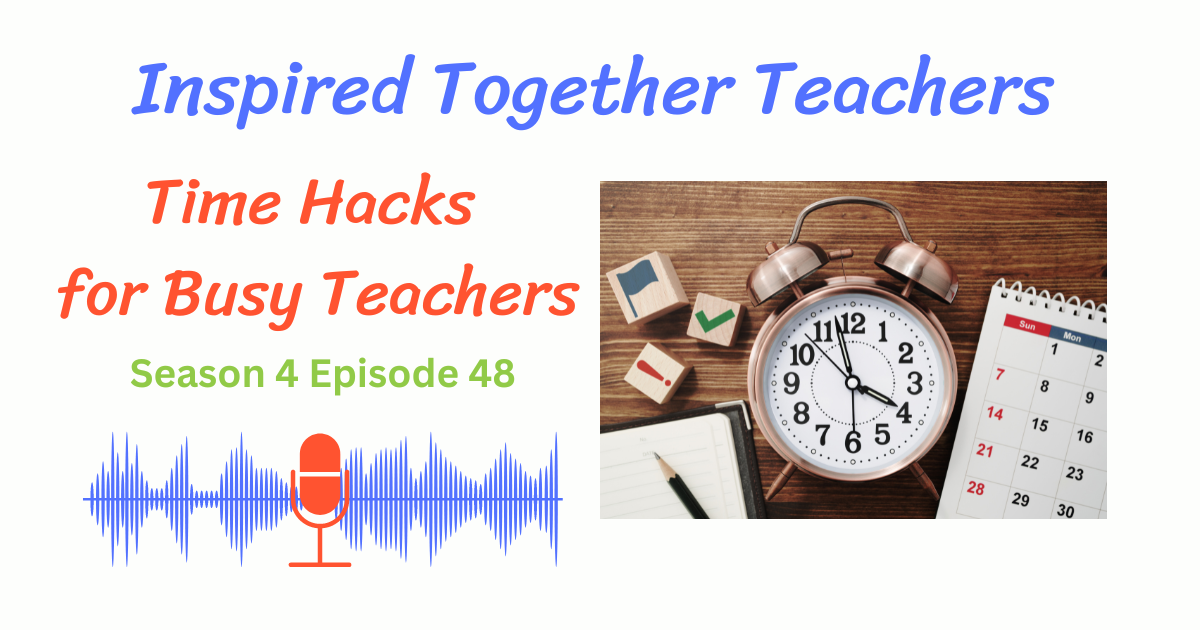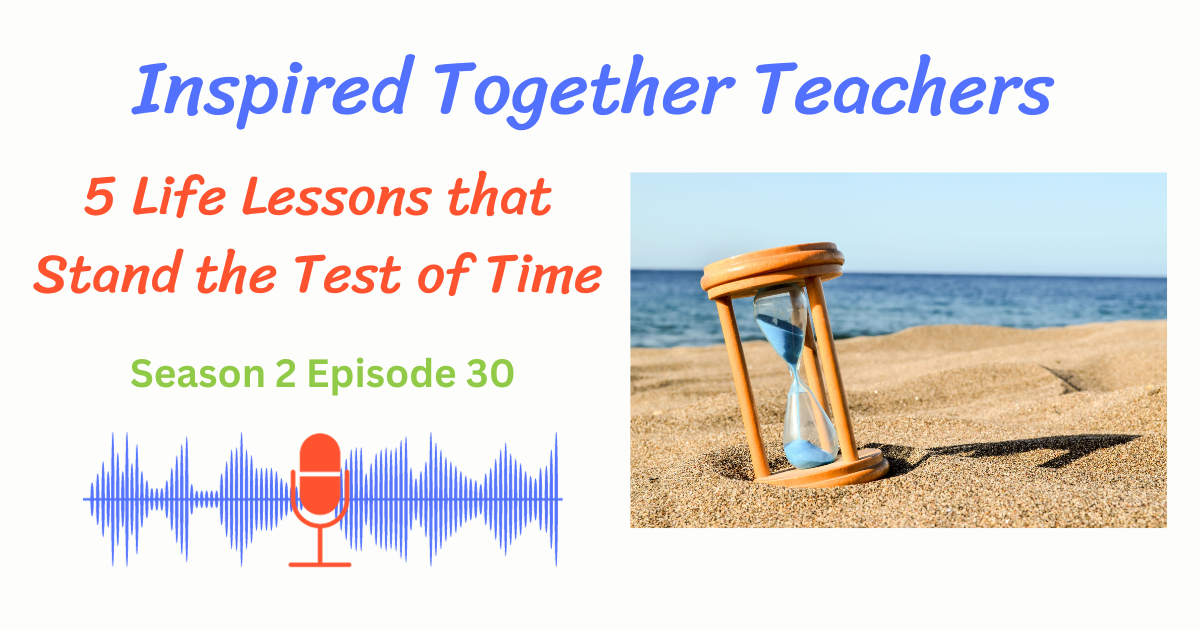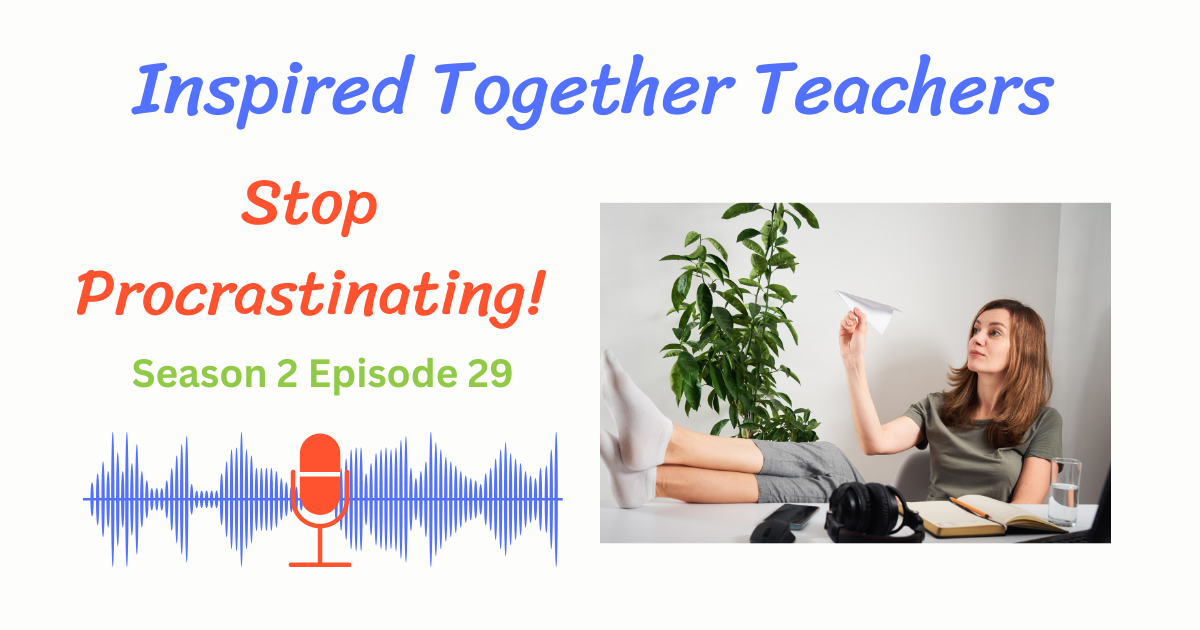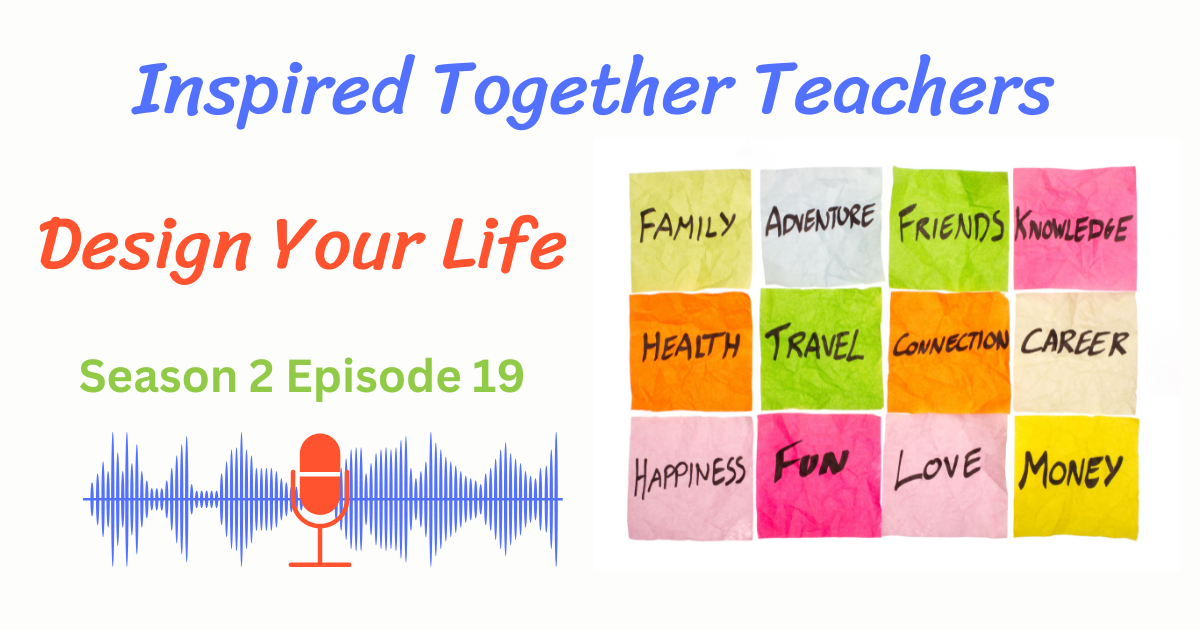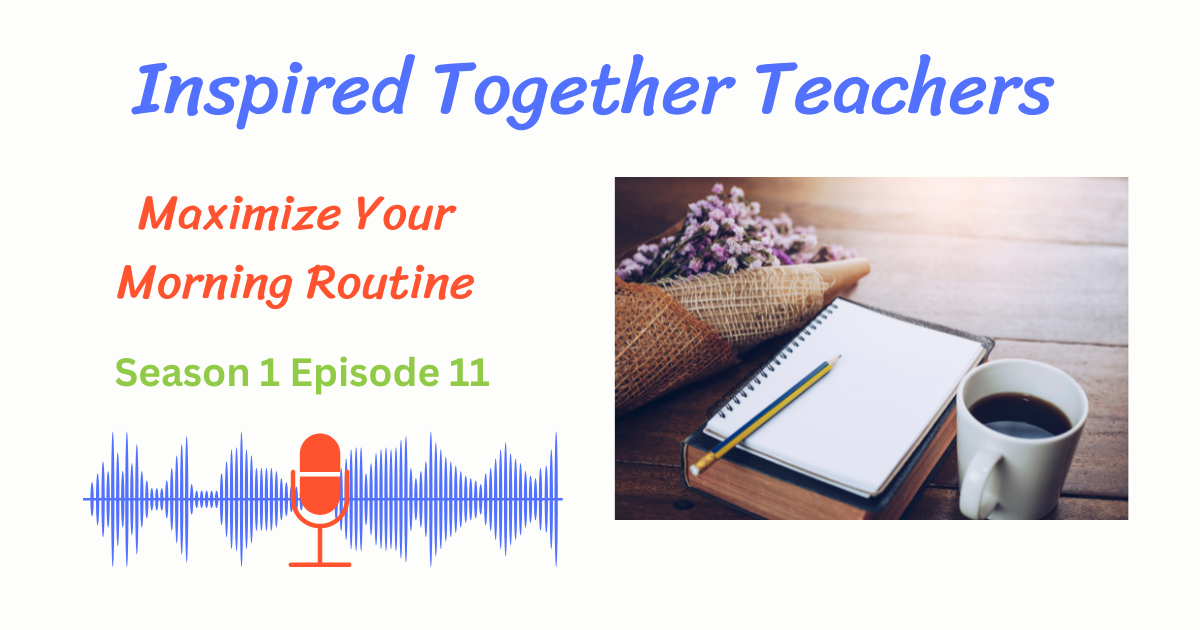Time Hacks for Busy Teachers S. 4 E. 4
Listen to this episode to learn more about ways you can make the best use of your time in order to avoid the frustration and overwhelm of not getting things done.
Show notes:
Episode Summary:
Do you often feel too busy, overwhelmed with things to do, and over extended? Are you fueled by caffeine, using sugar as a quick boost or living on adrenalin? If so, you might benefit from these time hacks that will allow you to make the best of your time and take control of your to-do list.
In this episode:
The following is a summary of the content in this episode. To hear all of the examples and stories, please listen to the podcast episode.
Introduction:
So many of us are chronically exhausted with all the things we have to do. Do you feel like you never get enough done? Are you constantly putting out little fires everywhere? Are you over committed and overscheduled?
Other signs that you might be out of control with your time is that you put things off to the last minute, creating stress and urgency as you rush to get them done. Likewise, you may speed while driving to avoid running late. You find yourself procrastinating not because you don’t want to do the things you need to do, but because you don’t even know where to start.
Dealing with a constantly overloaded system causes adrenalin to keep running through your body. Adrenalin is great, and it helps keep us safe in times of disaster or when we are in true danger. But when we aren’t in danger, it just overloads our system. We stay in fight or flight mode which causes chronic stress.
If you want to know more about that, listen to episode 16, Real Self Care, where we talk about ways to stop stress hormones from flooding your system.
We’re all been overloaded and stressed by our work load. We’re talking you today not because we have totally mastered time, but because it is regularly something that we think about and plan for.
Today we’re going to share some time hacks that might help you get back in control of your time.
Time hack #1: Eliminate distractions and interruptions.
Every time your brain switches from one activity to another, it takes up to 15 minutes to adjust to the new task and then back to the first task as we refocus. That’s inefficient. When we are busy, it is tempting to try to juggle several different activities at once, but means nothing is getting our best attention.
It’s possible to control the disruptions with a few of these ideas:
- Turn your phone on silent when you are working. You don’t always need to answer the phone when it rings! Likewise with computer notifications.
- Close your door when you are trying to get serious work done. It prevents the coworker from stopping in to chat during your prep time.
- Watch how often you are scrolling on your phone. Scrolling is a serious time disrupter. You think you’re taking a break and then you look up and 30 minutes have passed.
- Try using the Pomodoro technique where you focus on one task for 25 minutes before you take a five minute break.
- Check email a couple of times a day, rather than checking it constantly. There is always going to be something new in your in box, but you rarely need to see it right away. You can set an auto responder that tells parents what times you will check your email and when they can expect a response from you.
- Turn off push notifications on your phone and computer.
It is a great idea to control your time where you can.
Another way to get on top of your to-do lists is to use batching.
Time hack #2: Learn to batch tasks.
Batching tasks means that you put like items together and then handle them all at once.
Many of you already know that food prepping on the weekends makes your week run more smoothly and help you eat better. Apply that same idea to other tasks.
Instead of going to copy something every time you need copies, try to make all of your copies for the week ahead of time.
Put all your errands together and run them at the same time.
The same principal works with home chores too. It may seem easier to throw in a load of laundry every day, but it adds to your mental load every time you do it. You might actually save time or energy if you do it all on the same evening or weekend morning.
Consider how you can save time or mental energy by batching your tasks.
Time hack #3: Set up an environment for success.
You probably spend most of your time in one of three environments, your home, your classroom, or your car.
Consider how these spaces support you. How do you feel when you are in your spaces?
At home, are things fairly organized so you can find what you need easily? Is it over stimulating with too much stuff?
Is your home calm and relaxing or chaotic? What could you do at home that would support you throughout the week? Play soft music? Light a candle? Have dinner ready in the crock pot?
The same ideas work at school. Is it time for cleaning out and organizing the things in your room? Do you need a refresh? Is your classroom full of visual clutter that stresses you out? Try taking a few things off the walls. Over stimulus causes you to fight to attend to things. Some students are very susceptible to too much stimulus and it can act on their nervous system in a detrimental way.
Don’t forget your car. How does that environment support you? Could you pack your bags and put them in the car the night before? Keep your gym bag in the car, filled and ready to go? Keep an extra phone cord in the car for when your phone drains down?
It is difficult to relax and unwind on your drive home from work if you are surrounded by empty coffee cups and the French flies the kids spilled on the floor.
Time hack #4: Know your daily “must-do” tasks.
We often have expectations of getting more done than we can possibly handle. If you have one forty minute prep period and plan to grade assignments from 8 classes, you are setting yourself up for failure.
Narrow down your expectations:
- What are your top three priorities for the day? If you only got these three things accomplished, your day would be successful.
- Who needs you on your “A” game? This one reminds you that people are your priority.
- What can I do for myself today to bring me joy, peace or fulfillment? Don’t forget about yourself in the process.
Time hack #5: Spend a few minutes each day in silence and reflection.
You need room to slow down and breath. Silence also allows you to connect with your inner voice, which usually offers wisdom. It will allow your creative a chance to come through. A few minutes of reflection will often slow you down enough to see the big picture, to help you make good decisions and good choices, all of which can improve your focus and time management.
Your silence can look like many things- a walk in nature, exercise, journaling, meditating, praying, or just spending a few minutes looking out the window.
A few minutes of silence and reflection is a way of plugging into your own energy source, a way of recharging your inner battery. When your battery is charged, things run more smoothly. There are fewer glitches and you will feel that you have more control over your day. And as a bonus, it often helps you to stay closer to your dreams and follow through on the goals that will make them come to life.
All of these ideas come down to making things less chaotic and more simple. Take control of what you can control. Taking control of what you can will allow you to take control of your to-do list.
Recap:
Most of us are challenged by not having as much time as we’d like, but all of us are challenged to work with in the same 24 hours per day. We can’t get more time, but we can make better use of our time and set up systems and processes that will allow us to use our time in the best ways possible.
Quote:
You can’t calm the storm, so stop trying. What you can do is calm yourself.
The storm will pass.
Timber Hawkeye
Related Episodes/Blog Posts:
Inspired together Teachers podcast episode 16, Real Self Care
Connect with the Inspired Together Teachers Community:
Download our FREE resource: The Inspired Teachers Guide to Taking Back Your Life.
Website: https:www.inspiredtogetherteachers.com
Instagram: Inspired-Together-Teachers
Facebook: Inspired Together Teachers
Facebook Teacher Warriors Group: Teacher Warriors Facebook Group
Linked In: Inspired Together Teachers
More About Inspired Together Teachers:
Are you a teacher struggling to balance your best work with your best life?
If you are dedicated and caring but often overwhelmed and exhausted, join us at Inspired Together Teachers. We’ll give you inspiration, strategies and tips that help you navigate life’s challenges as a stronger, more confident, and more joy filled person, both in and out of the classroom.
Inspired Together Teachers will give you practical tools to experience more of what matters most in your life.
Co-hosts Paula Schmidt and Michele Vosberg are award winning educators with the experience and skills to help teachers thrive in life and work. They’ve taught at all levels, worked with thousands of teachers, and conducted workshops around the world. They are also the authors of the #1 best-selling book The Inspired Teachers Journal: A Weekly Guide to Becoming Your Best Self.
Paula and Michele would love to have you to join them on their quest to lived inspired lives.

